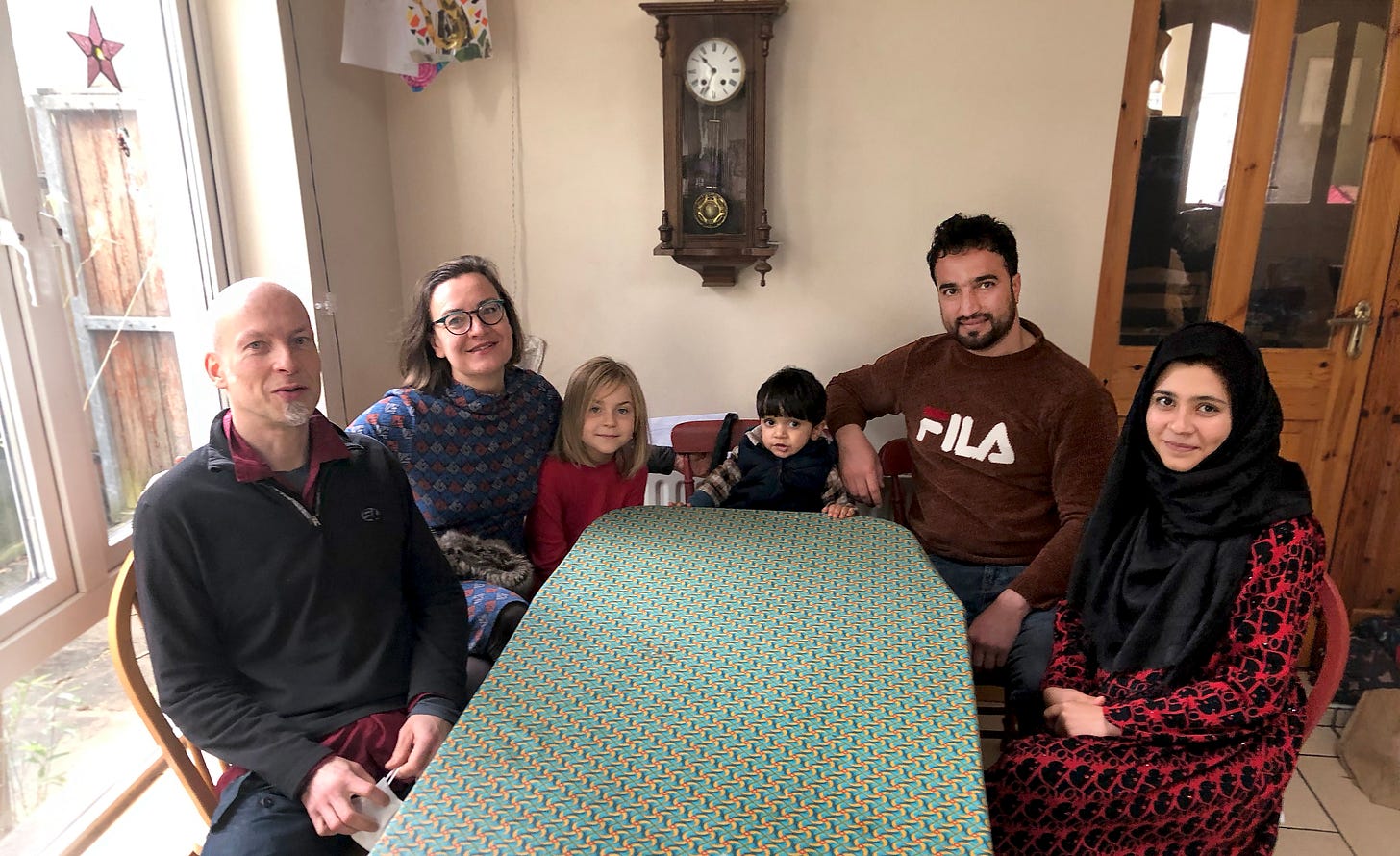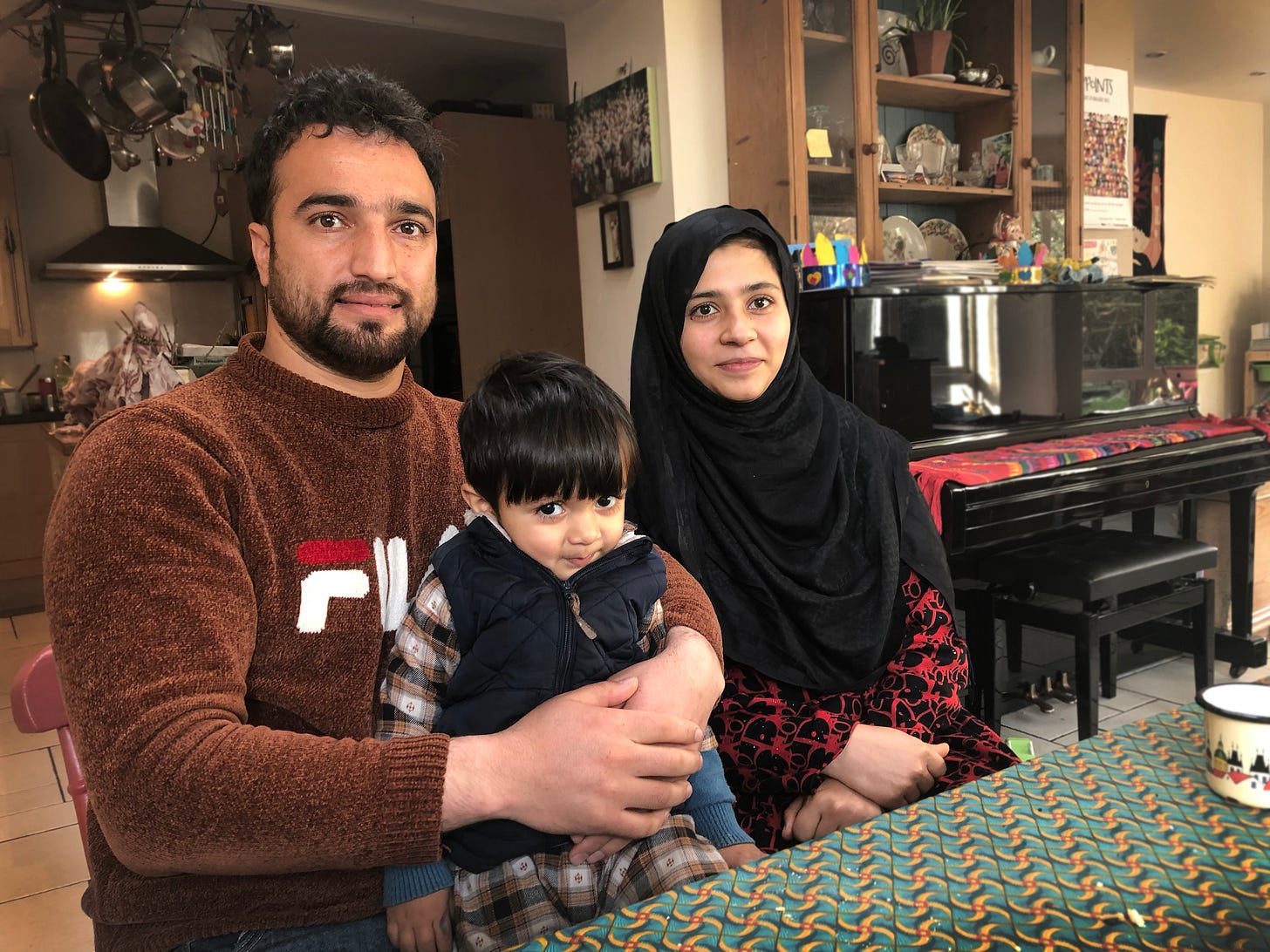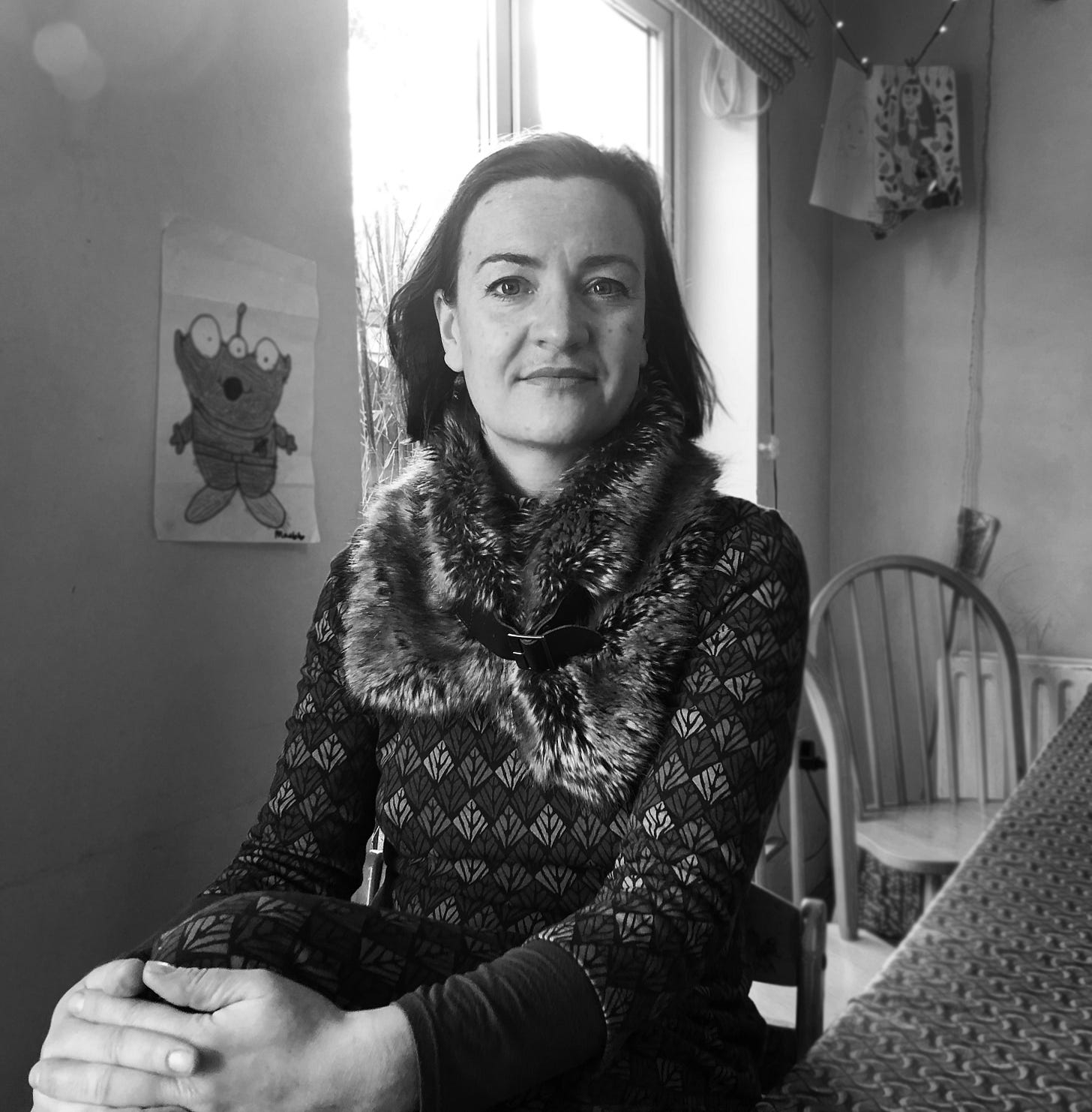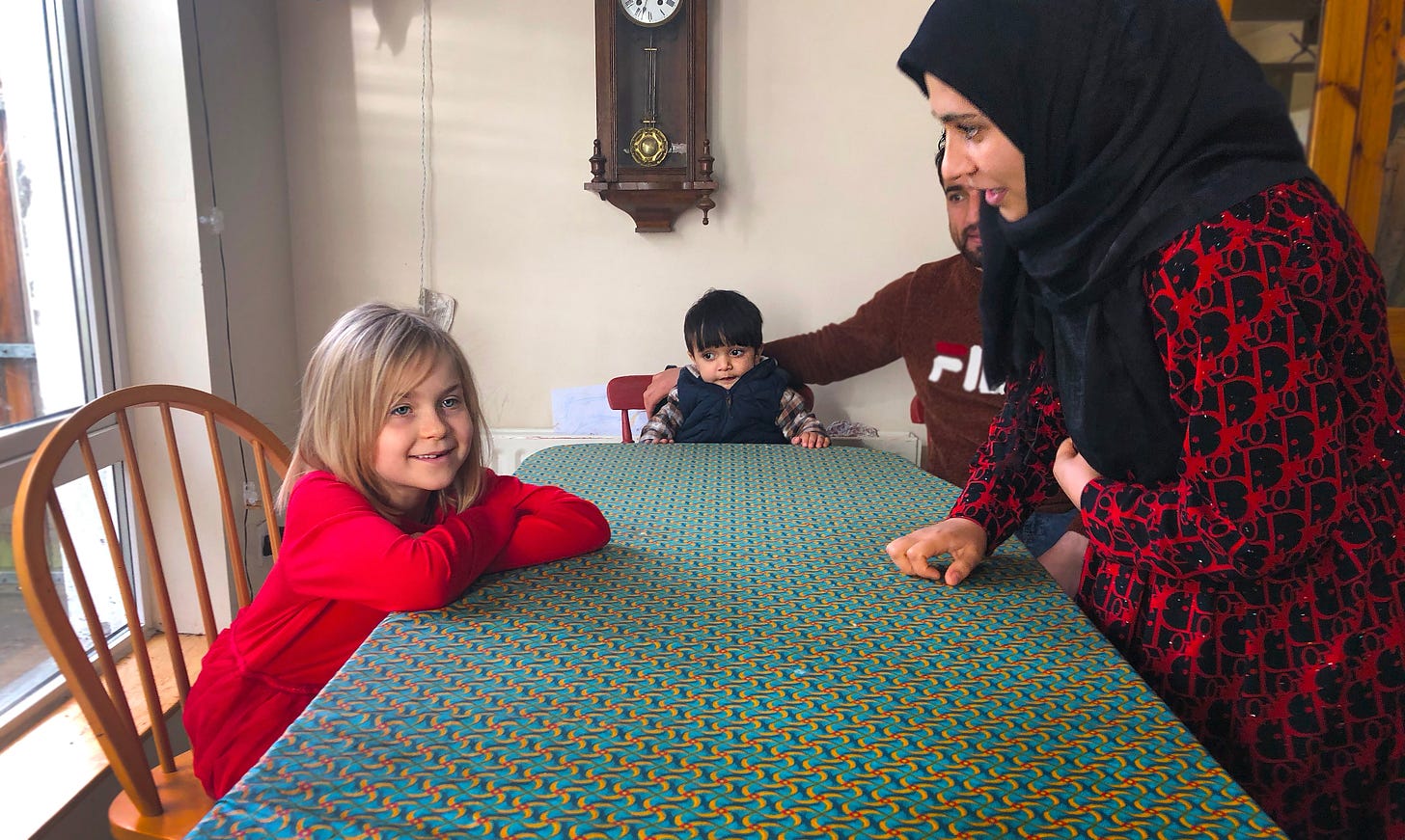An 8,250km journey to Cork and to safety
One week after the Naderis' arrival in Cork, the young Afghan family and their hosts give us a glimpse of what their shared life is like, and what led to the Naderis fleeing Afghanistan.

Hamed Naderi doesn’t have clear memories of the last time the Taliban ruled Afghanistan. He was too young. He’s 29: the Taliban were formed in the first year of his life, and came to power for the first time when he was just three.
“My childhood was in the period of Karzai’s government,” Hamed tells me. “I don’t remember the Taliban. But my mother and father told us about it; that they were very cruel people, with very hard laws, especially for women. They destroyed all the intellectual things, the history and culture. About women, they are very, very dangerous. But I don’t remember.”
His wife Samira, 23, sitting by his side, drinking green tea and holding their toddler Zahed, was just two when the US invasion of Afghanistan in 2001 ended the Taliban’s reign.
And although it may be hard to imagine for those who were adamantly opposed to the US’ “War on Terror” in the aftermath of 911 - I remember the protests in Cork, and they were considerable - the Naderis are more angry with America for leaving. Their abrupt withdrawal from Afghanistan in August of last year left it open for the Taliban to rapidly seize control.
“Afghans cooperated with Americans: why did you leave us to the Taliban?” Hamed says. “The Taliban’s rules and laws are very strict, but anything they themselves want to do, they do. Because they are above the people.”
Hamed and Samira have been in Cork for exactly a week when I call to the house of their host family near Blackrock. As I’m shown to the kitchen, the Naderis are having a breakfast of flatbread and jam and tea, while Nicki Ffrench Davis and her husband, Bertrand Galen, and their eldest daughter, Minna, go about their business.
It’s a busy, cheerful, bustling house; Nicki and Bertrand, the Naderis’ hosts, are parents to three children under six, the younger two of whom, Maeve and Art, are at playschool when I call. So of course there are boxes of toys, books, children’s wellies in the hall, all the usual happy jumble of family life on display.
The Naderis extend a warm welcome and we sit. This must all still be quite strange to them?
“It’s all different,” Hamed says. “Eating and mealtimes are different, everything is. We are strangers to all of this, of course, but….we try to settle ourselves into all of it.”
It’s been a week of adjustments and unwinding, following a hair-raising travel ordeal which saw them stranded in Pakistan for several days, just when they thought they had got out safely.
Because since last August, the Naderis have been, to all intents and purposes, on the run. They have moved to three different safe-houses provided by a network of friends. Zahed is 20 months now, so they did all this with their one-year-old baby, Samira’s first. Were they frightened?
“My wife was very scared and I was very scared too,” Hamed says. “For my baby, and for my wife, and for my own life.”
After the Taliban seized control of Kabul on the 15th of August, western embassies, aid agencies and some NGOs fled the country. But the Afghan people who had worked for them were largely left behind, to a fundamentalist regime renowned for their brutality, who were likely to view them as traitors.
The British Embassy most famously acquitted itself in truly abominable style, leaving in such haste that they actually left written records of their Afghan staff, as well as the CVs and job applications of other Afghan people, right in the embassy building that the Taliban occupied.
Before the events of last August, the Naderis had been living in Kabul, the capital city, with Hamed’s parents and extended family of four brothers and two sisters.
That’s what Afghan life is like, Hamed explains: “In Afghanistan, it’s traditional that all the family lives together. We have separate rooms, separate kitchens and bathrooms, but Afghan people like to live together, to eat breakfast, lunch and dinner together.”
Hamed does most of the talking; his English is better. Hamed is of Tajik ethnicity, while Samira is Pashtun. She speaks Pashto and Persian, both the official languages of Afghanistan. But her English might be better than she lets on. When I ask Hamed what Samira studied in school, she suddenly replies, “accounting.”
"Hey, you understood!” I say with a joking finger-wag. “You speak English!” She smiles shyly. “But it is not good.”
Hamed has an undergraduate degree in Persian Literature and had worked for four years for the Afghan Women’s Network, a domestic-led NGO dedicated to furthering women’s rights, when the Taliban took power. Samira had been teaching in an all-girl’s school. “My wife always encouraged girls to empower themselves, to work in different types of jobs and to have education,” Hamed says.
These facts were enough to endanger their lives. Hamed and Samira having correctly predicted that they would become targets and having fled, Hamed’s family received a visit.
“Misdirecting women from Islam”
“When we left our house, two or three days later, the Taliban came and asked my father, ‘Where are Hamed and Samira?’ They told him we are guilty of misdirecting women from Islam. My father told them that we left Afghanistan, and they said, ‘our intelligence will find them. We know they are in Afghanistan.’
Hamed says the purge that is currently underway, as the Taliban seeks out those believed to be loyal to the US-backed former administration, is very real, and is being under-reported by Afghan state media.
“Their intelligence is very strong, and they will find the people they are looking for,” he says. “They kill a lot of people every day but the media can’t broadcast it.”
Through the Afghan Women’s Network, Hamed had befriended Joya Kuin, a Dutch woman who lives in Cork.

Samira’s elder brother Mansoor - she is one of nine children, and has four brothers and four sisters - had worked for an NGO and was also in danger under Taliban rule, and has been living in Cork for three months: Carrigaline, to be specific.
But it was through Joya that the Naderis found the Galen family as hosts. And it was through the work of a team of people, headed up by Joya, who launched petitions, pestered government ministers, came up with social media hashtags and generally made noise, that the Naderis were eventually granted a Visa Waiver under the Irish Refugee Protection Programme.
The interminable wait for all these processes to occur was a period still laden with fear and stress for the Naderis.
At Christmas, Zahed picked up an infection. He was hospitalised for febrile convulsions that Hamed describes as getting so bad that he administered CPR, believing that his heart had stopped; they thought they had lost their little boy.
Hamed couldn’t risk bringing his baby to hospital himself so the Naderis had to endure an agonising wait as Hamed’s father travelled to collect his grandson and bring him to hospital.
Even once the Naderis had arrived safely in Pakistan to take a flight to Dubai, the first step in their 8,250km journey to Cork, there was a final hurdle to overcome.
“Zahed didn’t have a passport,” Nicki Ffrench Davis explains. “The Afghan ID he had didn’t have a photograph on it. In the end, I think Joya had to get them to send photos of him from birth until the present to sort things out at the Irish end.”
“Then, they were at the airport and all the Irish paperwork was in place, and an hour before their flight, they were pulled in by the Pakistani officials because Zahed had no passport. It was nine o’clock at night here and bless her, the director of the Irish Refugee Protection Programme was straight on to the Department of Foreign Affairs on the phone and got them to speak to the Pakistani officials. Whatever happened next worked, and they were allowed on to their flight to Dubai.”
Friends collected the Naderis from Dublin Airport, and at four o’clock on the 27th of January, Nicki’s doorbell rang.
“I suppose I had been trying to visualise the scene for some time, just to kind of try and make it happen,” she says with a smile. “And then it was exactly as I imagined.”
“I was very nervous about how they’d find the house: would it be too messy, too cold?You can’t pretend to be something you’re not: you can try all you like, but if someone is going to be moving in with you, it’s pointless to pretend, isn’t it?”
Nicki had invited Samira’s brother over to check out life at the Galen-Ffrench Davis household, and he was also on hand to help cook a big Afghan meal of welcome for Hamed, Zahed and Samira.
“Then Joya and her partner arrived, and all twelve of us sat down to a big meal together.”
While a great number of Irish people support refugee aid agencies, get vocal about the injustices of the world on social media, and like to think of themselves as proactively supportive of people living in politically unstable, wartorn or dangerous countries, it’s quite the step to put your money where your mouth is and invite and entire family that you don’t know, and that has drastically different customs to your own, to come and live in your home, I put it to Nicki and Bertrand.
“Why not?” Bertrand says with a shrug. He’s French, a violin-maker with his studio in his back garden. “We’re lucky enough to have a big house, so how do we make the best of it? If we can help people because we have the space, let’s do it. The children are quite happy and it’s really good for them, and it’s good for us, too.”
“A couple of years ago, there was a big fresh influx of Syrian refugees and I had said to Joya, that we should really use our space by giving a room to a refugee,” Nicki says. “There are programmes for that, but they involve raising a lot of money and forming a whole community group, and I didn’t have the time and energy. So when Joya took on the Naderis, she remembered me saying that. She called me up and described the family and little Zahed and I thought, this just seems a really good fit.”
The future?
We all like to pride ourselves as being full of céad míle fáilte in Ireland, and Hamed is enthusiastic about their experiences of Cork so far, on walks to nearby parks and into the city centre.
“In this one week, we found that Irish people and especially the people of Cork City are very peaceful, kind and lovely people,” he says.
But this is just the first step: there are many bureaucratic hoops to jump through, in getting PPS numbers and residency permits, finding a GP and beginning the daunting task of finding a house of their own, finding a school to register Zahed in.
They want to start with English language classes, and both Hamed and Samira want to further their education. “My degree in Persian literature is useless here, I am thinking,” Hamed says with a laugh. “My wife would like to teach, or maybe to be a nurse. But we would like to get more education and better ourselves first.”
Joya Kuin has started a GoFundMe page to raise money for the Naderis, which has raised over €5,000 of an €8,000 goal: she and Nicki are acutely aware, in particular, of the difficulties of finding housing in Cork.
In the meantime, in Afghanistan, an enormous humanitarian crisis is happening in a country whose economy had predominantly relied on foreign aid for the past 20 years. An estimated 20 million Afghans are at risk of famine. The Taliban government has created a food for work programme that is suspected of being a method of funnelling humanitarian supplies through government coffers.
Are Hamed and Samira worried about the family they have left behind?
“Ordinary life is not to be taken for granted in Afghanistan,” Hamed says. “Their lives are not safe. Of course we are very sad: our relatives, our parents, our families. My parents cry when we talk to them because they can’t see Zahed.”
“Nobody would leave their family, their country, their culture, their home unless they have to. We didn’t have another way. ”







Well done Nikki and Bertrand <3 Welcome Naderis
What a story. Incredible